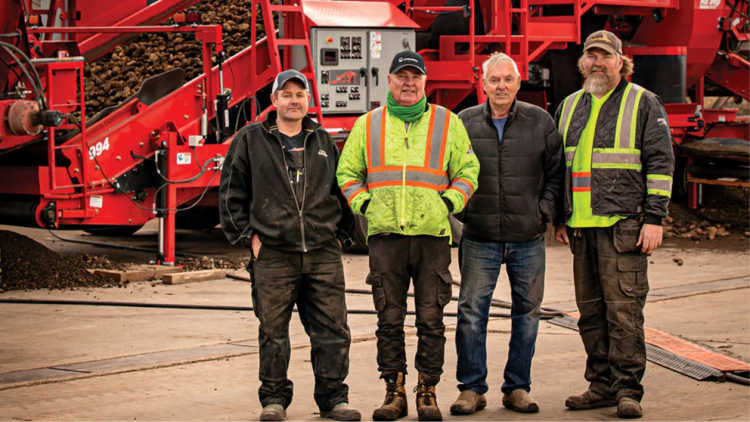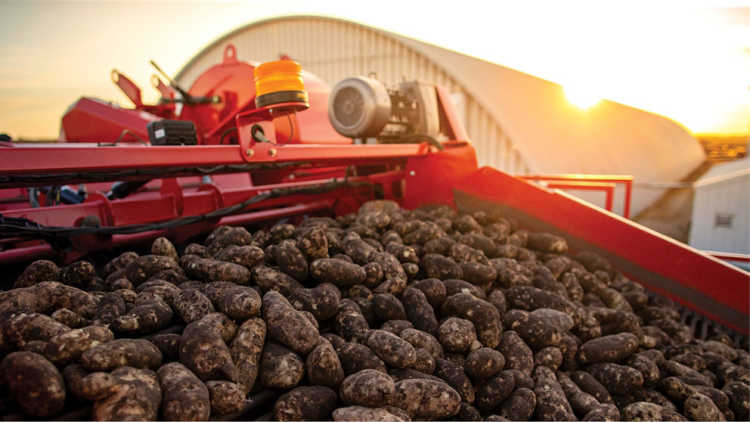Strong relationships fuel farm success

Pictured (L to R): Kevin, Doug, Bruce and Chad Berry
When relationships are nurtured with all stakeholders – from immediate family members to employees, suppliers, community and industry – good things are bound to happen.
The Berrys have combined big ideas, efficiency, measured risk, and a team approach to drive growth.
That’s certainly the case at Under the Hill Farms Ltd. and Over the Hill Farms Ltd., the enterprises owned and operated by the Berry family near Cypress River, Man. Fun fact: one farm got its name because it becomes visible when you drive over a hill; the under the hill moniker was chosen for the potato business and the need for spuds to grow under hills.
Over the past two decades, brothers Doug and Bruce Berry, together with their sons Chad and Kevin, have combined big ideas, efficiency, measured risk, and a team approach to drive growth. Today the combined operation seeds 13,000 acres of diversified crops.
Mitigating risk
Some might call the Berrys aggressive when it comes to growing the farm business, but Chad views it through a different lens.
“We’re definitely risk takers, but we try to make sure everything’s the right size and it justifies the equipment we have to use to get the job done. The efficiencies of running the farm definitely show up as you get to a certain size; you can buy better and you can market better.”
Efficiencies of low employee turnover
They also have their own view of how to effectively engage, manage and appreciate the people who help make Under and Over the Hill farms successful. With 14 full-time and 20 part-time employees, the operation is one of the largest employers in the Cypress River area. It has very little turnover and a highly motivated team eager to contribute to success.
“You have to treat your staff with respect. The better you treat people, the more you get accomplished; and happy people work better than unhappy people,” Chad says. “Most of our staff are long-term employees. If someone comes out here, if they fit in, they’re going to be here as long as they want to be.”
A reliable and committed staff also makes the business more efficient. “It reduces training time every season,” Chad says. “You’re not always explaining the machinery and equipment to people. They understand how it runs and that means less breakdowns and less accidents.” With many fields to navigate, long-term staff know their way around.
Handle suppliers, landlords with care
The Berrys take a similar approach when it comes to business suppliers. “Most of our relationships with our suppliers and people we contract with are long-term commitments,” Chad notes.

Since Under the Hill Farms started growing potatoes 25 years ago, they’ve used the same retailer to manage the fertility needs of their potato fields. “If we’re working with someone and they treat us correctly, we're going to be there for a long time.”
Their relationship management includes a unique approach to supplier appreciation. Several years ago, they purchased a local golf course that now plays an important role in supporting the farming enterprise.
While most businesses the size of Under and Over the Hill farms would expect to be wined and dined by suppliers, they do the opposite. Every year they invite farm suppliers to a golf tournament designed to say thanks for their contribution to the success of the business.
“We invite all our parts, chemical and input suppliers – everyone we contract. We just have a fun day. Everybody gets to mix and meet and have a steak supper,” Chad says. The golf course restaurant also supports farm staff, delivering up to 40 meals daily during harvest season.
And with 40 per cent of their crop seeded on rented acres, Chad notes landlord relations are a key focus. “You’ve got to have long-term relationships and treat them fairly,” he says. “We have to be consistent, do a good job and take care of that land.”
Division of duties
When it comes to family farming, nowhere are relationships more important than within the immediate family. Under and Over the Hill farms are two corporations with Doug, Bruce, Chad and Kevin being shareholders. Over time, they’ve all found their niche within the operation.
“My father’s more of an ideas man. He works to get stuff done and trains a lot of our people. Bruce does all the book work, paperwork; keeps everything aligned in the office,” Chad explains. “Kevin looks after the grain harvest and I look after more of the potato harvest. We all make decisions as a group and it’s worked very well.”
For the last 15 years, Chad has been on the board of the Keystone Potato Producers Association, and he’s been president for 10. It’s a large commitment, 30 to 40 days a year, but he believes it’s important for farmers to help guide and direct their industry. “It’s also good for our farm to be up to date and know what’s happening,” he notes.
Learn from peers
Visitors to Under and Over the Hill farms should be warned that the Berrys are an inquisitive group – they’re always on the lookout for new ideas or the next best thing. FCC senior relationship manager Tyler Thompson confides that he always comes armed with fresh industry insights and ideas or a new business nugget when he connects with Chad and the Berry team.
Chad believes that relationships with FCC, other suppliers and industry contacts play a key role in helping the farm manage risk. “I learn from other people. That takes away a lot of risk. If somebody else has already done something, you get to learn from it. If you just stick in your own bubble, you’ll never change. And in this industry, you can’t not change.”
Innovation investments
To fuel growth and efficiency, Under and Over the Hill farms rely heavily on innovation. “We always try and be at the forefront and push the technology as fast as we can,” Chad says. When Manitoba announced provincial support for solar power on farms, they quickly signed on. It’s been a big win. “We’ve got seven solar sites on the farm. It’s just about a megawatt of solar and it supplies most of our high-cost electricity.”
Other crop production and technology innovations can be seen throughout the farming operations. Coloured beans have been a successful enterprise. “We geared up to do it right and we have the equipment to do the job,” Chad says. An investment in irrigation is also proving to be a shrewd move. “It’s something new in this area but we had a dry summer and it’s really paying off. It’s guaranteed our crops and is reducing the risk of spending money on inputs and getting a low return.”
Getting through the challenging years
But not every venture is a winning one, Chad admits, and some of their key enterprises go through troubling times. “We had a tough harvest last year. We left a lot of our beans in the field.” The potato crop was challenging, too – 20 per cent of the crop was left unharvested. That’s farming, he says. Dealing with adversity is part of the territory.
In 2020, the Berrys stretched the operation again with their first crop of zero-till potatoes. They had some success they’ll try to build on in 2021.
Chad doesn’t expect his partners will stray too far from their current path in the years ahead. “We’re willing to change and push the farm into different operations and different crops if it makes sense for business operations,” Chad says. “You just move on to next year. You can’t do anything about what happened in the past other than plan for the future.”
From an AgriSuccess article by Bernard Tobin.

The advice of experts on liability issues related to agricultural technology, the environment and human resources.
